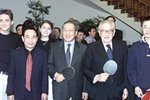30th Anniversary of "Ping-pong Diplomacy" Marked in Beijing

30th Anniversary of "Ping-pang Diplomacy" Marked in Beijing
A grand reception was hosted at the Diaoyutai State Guesthouse Sunday evening to mark the 30th anniversary of the historic "ping-pong diplomacy" in China-US relations.
Some 30 years ago in 1971, a US table-tennis team paid a visit to China after many years of estrangement and antagonism between the two countries, shocking the entire world and also opening the door for China-US people-to-people contacts. In fall the same year, the then US Secretary of State Henry Kissinger visited China, followed by another historic visit by President Richard Nixon in 1972, which paved the way for the normalization of bilateral relations.
Prior to attending Sunday's reception, Chinese Vice Premier Li Lanqing met with Dr. Kissinger, who is currently on a China tour, and praised his consistent contribution to Sino-US relations, and expressed the hope that he would continue to play an active role in this regard.
The scene at the reception was quite memorial: the venue, the NO.6 building of the state guesthouse, is where Dr. Kissinger took residence during his first visit 30 years ago; present at the occasion were many veteran diplomats and sportsmen who took part in the "ping-pong diplomacy"; as part of the celebration, a ping- pang game was held between young Chinese and US students.
In a toast, President Chen Haosu of the Chinese People's Association for Friendship with Foreign Countries, a non- governmental institute hosting the reception, attributed the "ping- pong diplomacy" to the wisdom and far-sightedness of the leaders of both countries as well the initiative of non-governmental personages.
He said that in the past 30 years since then, Sino-US relations, although mixed with twists and turns, have always maintained the momentum of contacts and cooperation. China-US relations can't be a plain sailing due to considerable differences in their social systems and cultures in addition to influences by world political changes, he noted.
However, he pointed out, so long as leaders and people of all social circles from both countries continue the contacts and seek common understanding through equal contacts based on mutual respect, bilateral ties will steadily develop and enjoy a bright future. That, he added, could possibly be the best commemoration of the "ping-pong diplomacy".
Kissinger, in his toast, said US-China relations have come a long way since the "ping-oang diplomacy", and during the 30 years since then, great changes have taken place in China, which fully demonstrated not only the vision of the Chinese leadership but also the courage, tenacity and dedication of the Chinese people.
US-China relations should be based on the common interest of the two peoples as well as the peace, stability and prosperity of Asia and even the whole world, he said, expressing the hope bilateral ties would be further improved and consolidated.
|